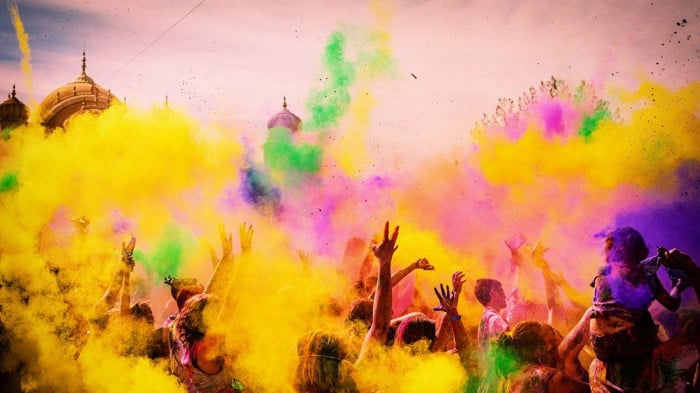Lathmar Holi in Barsana
Lathmar Holi is celebrated 4-5 days before other states’ Holi celebrations. However, it’s intriguing to see how this holiday is observed in the towns of Nandgaon and Barsana in Uttar Pradesh’s Mathura region. The settlements are about 42 kilometres from Mathura and are well-known for their Holi festivals. The locals are famed for their unique approach to Holi, which involves not just colours but also sticks. Lathmar Holi is a Hindi phrase that means exactly “stick and beat” and refers to playing Holi with a stick and colours.
Lord Krishna from Nandgaon is said to have visited Radha’s hometown of Barsana during Holi, according to mythology. In jest, Lord Krishna, who was known to be amicable with all the ‘Gopis,’ painted Radha’s face. In exchange, her friends and the town’s other females took offence and drove him out of Barsana with bamboo clubs. As a result, Lathmar Holi is in keeping with this story and is a reconstruction of this scene from Lord Krishna’s life.
Phoolon ki Holi in Mathura Vrindavan
Vrindavan’s Phoolon ki Holi is a magnificent festival that takes place on the inside of the temple grounds and is well-known both in India and worldwide. People forego the use of colours and water to play Holi with flowers on the Ekadashi preceding Holi. The priests of Vrindavan’s Banke Bihari temple throw flowers at visitors as soon as the temple gates open.
For believers, Mathura Holi is unquestionably a once-in-a-lifetime event. Krishna and Radha’s love tale started on the outskirts of Mathura and grew from there. Krishna was envious of her fairness, according to folklore, and complained to his mother about his drab appearance. To equalise the skin tones, he used to throw colours at Radha and color her face. The Radha-Krishna Leela, like any other, became a tradition, and Holi has only grown more lively and wild as a result.
Royal Holi in Udaipur
The 2 days of Holi celebrations in Udaipur are noted for being beautiful and majestic. The City Palace Burning takes place on the grounds of City Palace. The ruling Mewar monarch and his family light the Holi pyre, as the locals perform a folk dance called ‘Gair’ around the flames.
The Holika Dahan is followed by a big and spectacular march in Udaipur, with members of the royal family riding exquisite camels, elephants, and horses. On the second day, tourists and locals celebrate Holi around the city. Locals in various parts of old Udaipur play with colours, water pistols, and balloons. Passers-by are pelted with buckets of coloured water. Traditional foods are made in homes, and residents dance and sing traditional music to commemorate the occasion.
Holla Mohalla in Punjab
Holla Mohalla is devoted to the Sikh community, particularly the Nihang armed order. It is an annual festival where Nihangs, who have been famed for their heroic acts dating back to Ranjit Singh’s time, demonstrate their martial arts talents in a distinct yet ancient style. They play Holi by applying colours to one other because it is the day after Holi. In Punjab, this holiday is observed with zeal and dedication.
Thousands of people travel to Anandpur Sahib, Punjab, India to watch this annual event, which features a powerful demonstration of martial art and sword fighting by Nihang Sikhs, the warrior class of Sikhs, in simulated conflicts. The Nihangs are members of the Khalsa Army, and their blue robes and orange turbans, complete with sashes, give them a noble appearance. The festival also includes community service in the form of ‘langars,’ or community kitchens.
Elephant Festival in Jaipur
The Holi celebrations in Jaipur are one of the most fascinating events in India. During Holi, the Pink City hosts the famed Elephant Festival, which features a colourful parade with chariots, palanquins, and the presence of gigantic elephants. s possible.
Jaipur has become known for its traditional Holi celebrations. People swarm the streets in joy and excitement, wearing traditional clothing dyed in vivid hues, and festivities not only visit one another to play and eat, but also to attend annual carnivals. The Elephant Festival in Jaipur is however one event that exemplifies how much fun the citizens of the Pink City believe in having.
Yaoshang Festival in Manipur
Yaoshang is regarded as one of Manipur’s most important celebrations. People from many communities come together to participate in the festivities. The celebration, which lasts five days and is held on the full moon day of the month of Lamta, is usually held at the same time as Holi. Unlike Holi, though, the festivities are much more than just about colours. Singing, dancing, and a variety of other traditional performances are all part of the celebration. It is cheerfully observed by both young and old people, regardless of their gender or age. Children, adults, and people of all ages participate in this festival, which celebrates love.
The ThabalChongba is a famous Manipuri folk dance that witnesses boys and girls dancing in a circle. It is a nighttime dance with the literal meaning of moonlight dance. It is a traditional Manipuri get-together held at night under the full moon. For the dance, outsiders and friends alike get along. They share happy memories while listening to music and laughing. One of the most important features of the event is the use of colours, people paint each other’s faces and youngsters use water cannons to throw water on each other.

